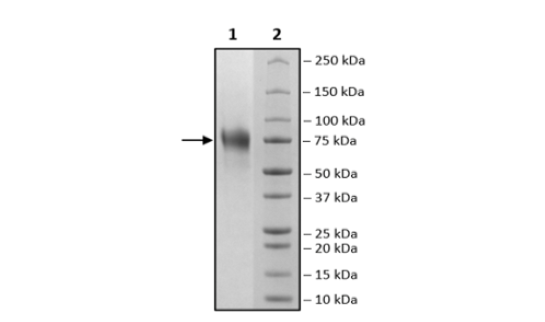FGFR1, Avi-Tag, His-Tag Recombinant
Recombinant human FGFR1 (fibroblast growth factor receptor 1), encompassing amino acids 22-376 (extracellular domain). This construct contains a C-terminal Avi-tag™, followed by an His-tag (6xHis). This protein was affinity purified.
≥90%
Aqueous buffer solution.
8 mM phosphate, pH 7.4, 110 mM NaCl, 2.2 mM KCl, and 20% glycerol
FGFR1 (fibroblast growth factor receptor 1), also known as CD331 and FLT2, is a member of the Fibroblast Growth Factor Receptor family, a family of four membrane-spanning tyrosine kinases (FGFR1-4) which serve as high-affinity receptors for 17 growth factors (FGF1-17). The FGF Receptor family plays an important role in multiple biological processes, including mesoderm induction and patterning, cell growth and migration, organ formation and bone growth. FGFR1 is alternatively spliced generating multiple splice variants that are differentially expressed during embryo development and in the adult body. Mutations in this protein can result in congenital disorders, such as Kallmann syndrome and osteoglophonic dysplasia. Its gene is frequently mutated, duplicated or fused with other genes, resulting in cancer. Binding to its ligand activates cell specific pathways, including RAS/ERK, phospholipase C/PI3K (phosphoinositide 3-kinase)/AKT, and others. Several inhibitors have been developed targeting the TK (tyrosine kinase) ATP pocket, such as dovitinib, which is used in the treatment of breast and lung cancer.


